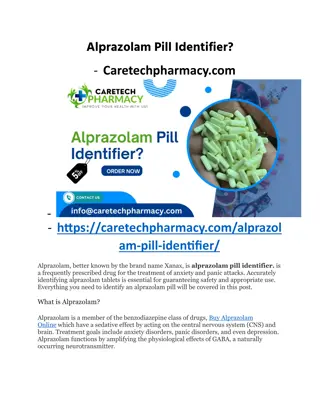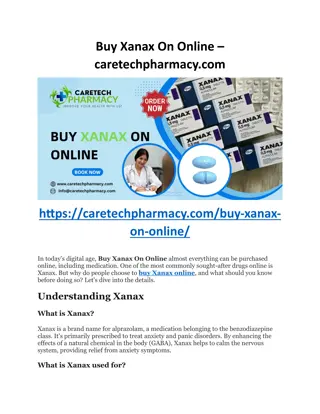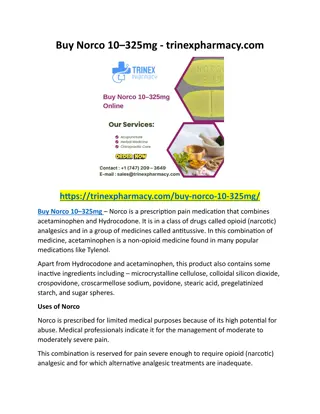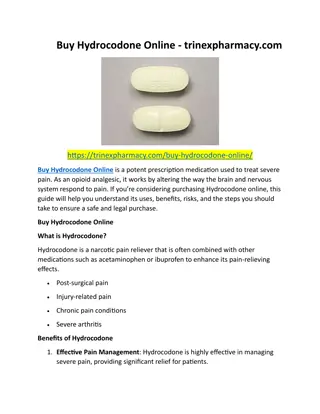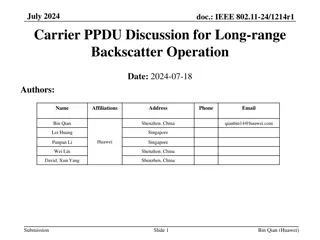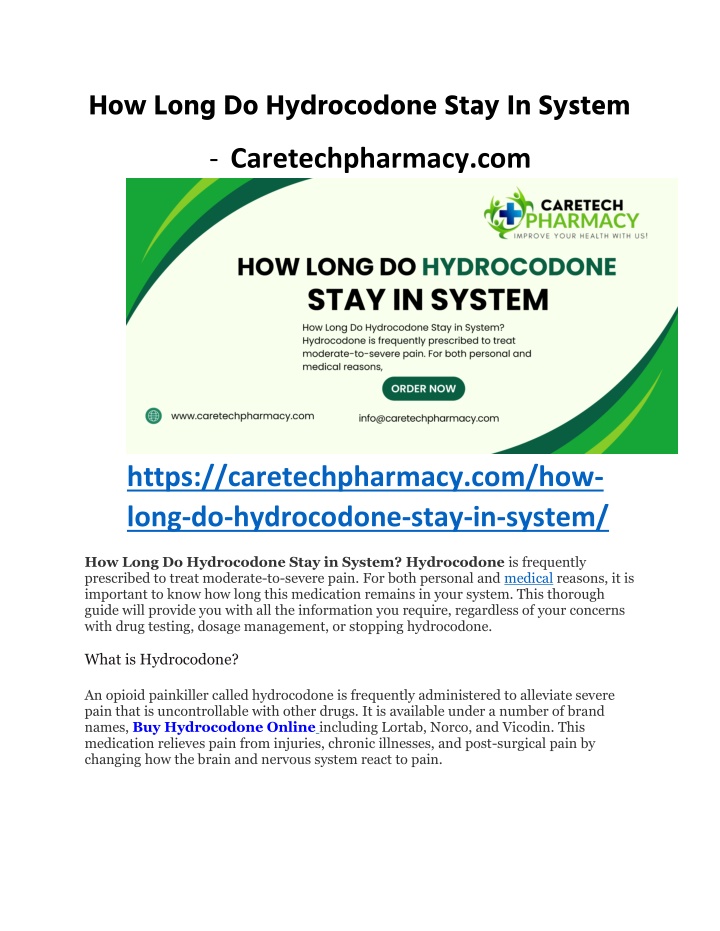
HOW LONG DO HYDROCODONE STAY IN SYSTEM - CARETECHPHARMACY.COM
How Long Do Hydrocodone Stay in System? Hydrocodone is frequently prescribed to treat moderate-to-severe pain. For both personal and medical reasons, it is important to know how long this medication remains in your system. This thorough guide will provide you with all the information you require, regardless of your concerns with drug testing, dosage management, or stopping hydrocodone. Phone: 1 (559) 744-3685 E-mail: info@caretechpharmacy.comnnn
Download Presentation

Please find below an Image/Link to download the presentation.
The content on the website is provided AS IS for your information and personal use only. It may not be sold, licensed, or shared on other websites without obtaining consent from the author. If you encounter any issues during the download, it is possible that the publisher has removed the file from their server.
You are allowed to download the files provided on this website for personal or commercial use, subject to the condition that they are used lawfully. All files are the property of their respective owners.
The content on the website is provided AS IS for your information and personal use only. It may not be sold, licensed, or shared on other websites without obtaining consent from the author.
E N D
Presentation Transcript
How Long Do Hydrocodone Stay In System -Caretechpharmacy.com https://caretechpharmacy.com/how- long-do-hydrocodone-stay-in-system/ How Long Do Hydrocodone Stay in System? Hydrocodone is frequently prescribed to treat moderate-to-severe pain. For both personal and medical reasons, it is important to know how long this medication remains in your system. This thorough guide will provide you with all the information you require, regardless of your concerns with drug testing, dosage management, or stopping hydrocodone. What is Hydrocodone? An opioid painkiller called hydrocodone is frequently administered to alleviate severe pain that is uncontrollable with other drugs. It is available under a number of brand names, Buy Hydrocodone Online including Lortab, Norco, and Vicodin. This medication relieves pain from injuries, chronic illnesses, and post-surgical pain by changing how the brain and nervous system react to pain.
How Hydrocodone Works in the Body When you take hydrocodone, it attaches to the spinal cord and brain's opioid receptors, altering how pain is perceived and producing euphoric feelings. In addition to relieving pain, this dual effect increases the possibility of abuse and dependency. Factors Influencing How Long Hydrocodone Stays in Your System Several factors can influence how long hydrocodone remains detectable in your body: Dosage: Higher doses generally stay in your system longer. Frequency of Use: Regular use leads to accumulation in the body. Individual Metabolism: Faster metabolisms process drugs more quickly. Age and Health Conditions: Older age and certain health issues can slow down drug elimination. Body Mass and Hydration Levels: Higher body mass and better hydration can affect how quickly hydrocodone is metabolized and excreted. Detection Times for Hydrocodone Blood Tests It is possible to find hydrocodone in the bloodstream for up to 24 hours following the last dosage. Because blood tests have a shorter detection window than other procedures and are more intrusive, they are less common. Urine Tests The most popular technique for identifying hydrocodone use is urine testing. Urine containing hydrocodone usually shows up 2-4 days following the last dose. Depending on the previously listed variables, this window may change. Saliva Tests Hydrocodone can be detected in saliva samples up to 36 hours after the previous dosage. These tests are helpful in some situations since they are non-invasive and yield fast findings. Hair Tests The longest detection window is for hair testing, where hydrocodone can be found for up to ninety days. When evaluating long-term drug use, this approach is frequently taken.
Half-Life of Hydrocodone The amount of time it takes for a drug's blood concentration to drop by half is known as its half-life. The half-life of hydrocodone is about 3.8 hours. However, because several half-lives must elapse, the complete removal from your system takes longer. Hydrocodone Metabolism The liver is the primary site of hydrocodone metabolism, breaking down the drug into its metabolites, hydromorphone and norhydrocodone. These materials are then eliminated by the kidneys. The length of time hydrocodone remains in your system is largely determined by how well these organs function. Withdrawal and Hydrocodone If you've been taking hydrocodone on a regular basis, abruptly ceasing use can cause withdrawal symptoms like nausea, sweating, anxiety, and insomnia. After the last dosage, these effects may start a few hours later and persist for a few days. Reduction of the medicine under medical supervision can aid in better management of the withdrawal symptoms. Hydrocodone and Drug Testing Drug panels for legal, medical, or employment reasons frequently include hydrocodone. A positive test result may have serious repercussions, such as modifications to treatment, job problems, or legal ramifications. Being aware of the detection windows will help you control these risks. Hydrocodone Clearance While there's no quick fix to clear hydrocodone from your system, staying hydrated, eating a healthy diet, and exercising can support your body's natural detox processes. Be wary of myths and products that claim to "flush out" drugs quickly, as they often lack scientific backing. Special Considerations Hydrocodone and Pregnancy Pregnancy-related hazards associated with hydrocodone use include the unborn child's dependence and withdrawal symptoms, as well as risks to the mother. A healthcare professional should always be consulted before taking any medicine while pregnant.
Hydrocodone in the Elderly Because of their weakened livers and kidneys, elderly people may metabolize hydrocodone more slowly, requiring lower dosages and close monitoring. Legal and Safety Issues Because of its potential for abuse and addiction, hydrocodone is classified as a restricted drug. It must only be taken as directed by a medical professional. Misuse can result in lethal overdoses, major health concerns, and legal troubles. Alternatives to Hydrocodone Alternatives to opioids include non-opioid drugs like acetaminophen and ibuprofen, as well as non-pharmacological therapies including physical therapy, acupuncture, and lifestyle modifications for people seeking pain relief without the hazards involved. Conclusion It's critical to comprehend how long hydrocodone stays in your system in order to use it safely, manage your pain, and prevent unfavorable outcomes like drug test failure or withdrawal symptoms. Always take this medication as directed by a healthcare provider and use it responsibly. FAQs How long does hydrocodone stay in your urine? Hydrocodone can typically be detected in urine for 2-4 days after the last dose, though this can vary based on individual factors. Can hydration speed up the elimination of hydrocodone? While staying hydrated supports overall health, it won't significantly speed up the elimination of hydrocodone from your system. Is it safe to drive while taking hydrocodone? Driving while taking hydrocodone can be dangerous, as it may impair your ability to operate a vehicle safely. It's best to avoid driving until you know how the medication affects you.
How can I safely stop taking hydrocodone? To safely stop taking hydrocodone, it's important to taper off under medical supervision rather than stopping abruptly to avoid severe withdrawal symptoms. What are the signs of hydrocodone addiction? Signs of hydrocodone addiction include cravings, the inability to stop using the drug, withdrawal symptoms, and neglect of responsibilities due to drug use. Phone: +1 (559) 744-3685 E-mail: info@caretechpharmacy.com



